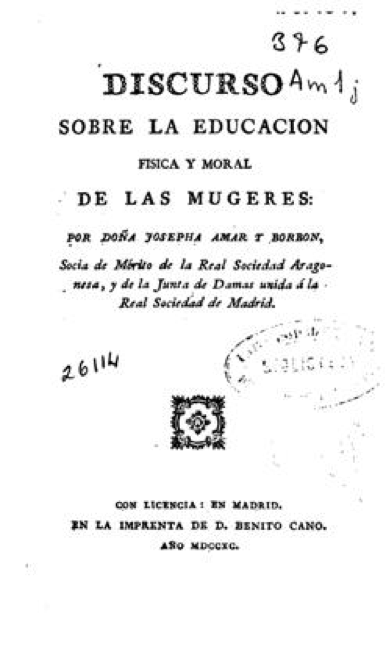With the rise of the Bourbon dynasty in the figure of Philip V (1700-1746), Spanish society underwent a process of rejuvenation aiming at forgetting the decline of the Empire under the Habsburg family and building a new state that would adapt to the European pace. Due to this fact, the crown was accompanied by a group of people willing to review society from other perspectives. Characters like Josefa Amar, the Duchess of Osuna and other women of the Junta de Damas, Josefa de Jovellanos, María Rosa Gálvez, contributed to spread the ideas of Enlightenment. And in the European context it is important to outline salonnières (Ninon de Lenclos, Suzzane Necker, Marie-Thérèse de Geoffrin), Olympe de Gouges, Emilie du Chatelet and Mary Wollstonecraft. Other major defenders of women’s right to education were Madame d’Épinay, Madame Lambert and Catharine Macaulay.

Josefa Amar y Borbón
Zaragoza; 1749 — 1833
Període d'activitat: 1782 — 1790
Classificació geogràfica: Europa > Espanya
Moviments socio-culturals
Edat Moderna > Il·lustració
Grups per àmbit de dedicació
Educadores > Pedagogues
Escriptores > Assagistes
Escriptores > Traductores
Context de creació femenina
Ressenya
Josefa Amar y Borbón was a pedagogue, writer and defender of women’s rights in the 18th century. Her figure is renowned because of her desire for self-improvement, against enlightened society. Equal opportunities for men and women, is one of her struggles, defending the role of women in political life, in society in general and not only at home. First woman member of the Real Sociedad Económica Aragonesa.
Justificacions
Biografia
Josefa Amar was born in Zaragoza on February in 1749. She was the fifth daughter of a famous physician to Ferdinand VI, José Amar y Arguedas and Ignacia de Borbón y Vallejo. She was brought up in an illustrious family. After her father's death, her mother was in her charge, despite the conditions of women at the time.
In her family, the tradition of the liberal professions of doctor and lawyer alternated, but she and her brothers took different paths: five of her six brothers opted for military career, while the youngest one, Francisco, became a clergyman. Her oldest brother, Antonio, became viceroy, general captain, and president of the Audience of Nueva Granada.
Due to her family's position, Josefa was surrounded by distinguished people such as Rafael Casalbón and Antonio Bermejo, who guided her in her studies. She stood out in different fields because she was eager to learn. She knew the entire work of French enlightened and ideologists, as well as John Locke's work.
Among other fields, she devoted herself to pedagogy; she was a translator, fluent in Latin, Greek, Italian, English and French; but her most outstanding work was undoubtedly that of a writer, as she is known to be one of the most important writers of the Aragonese and Spanish Enlightenment.
Despite all this, the concern of that time was that she should marry at an early age, so at the age of 23 she married a 47-year-old widowed lawyer called Joaquín Fuentes Piquer, a man she hardly knew and with whom she had her only son, Felipe, in 1775. She had to move to Zaragoza after the designation of her husband as judge of the National Audience of Aragon. Some years later she became a widow. This situation allowed her to continue with her intellectual activity.
Appointed in 1782 as a member of merit of the Real Sociedad Económica Aragonesa de Amigos del País, she devoted herself to debating social issues. Among the most prominent of these was the hard-fought defense of women's education.
She became a member of the Junta de Damas, linked to the Real Sociedad de Madrid, and later of the Real Sociedad Médica de Barcelona.
She died on 21st of February 1833.
Obres
Essays
Discurso en defensa del talento de las mujeres y de su aptitud para el gobierno y otros cargos en que se emplean los hombres, in Memorial literario, t. VIII, pp. 399-430 (1786).
Oración gratulatoria dirigida a la Junta de Señoras de la Real Sociedad Económica de Madrid, in Memorial literario, t. XII, pp. 588-592 (1787).
Discurso sobre la educación física y moral de las mujeres por Josefa Amar y Borbón. Madrid, Benito Cano (1790).
Translations
Ensayo histórico-apologético de la literatura española contra las opiniones preocupadas de algunos escritores modernos italianos. Disertaciones del Abate Don Xavier Lampillas, traducido del italiano al español por Josefa Amar y Borbón. Zaragoza, por Blas de Miedes, 6 vols. (1782-1784).
Respuesta del señor abate Lampillas a los cargos recopilados por el señor abate Tiraboschi en su carta al señor abate N. N. sobre el ensayo histórico apologético de la literatura española, traducido del italiano por Josefa Amar y Borbón. Zaragoza, Blas de Miedes (1786).
Diario de Mequínez, residencia del emperador de Fez y Marruecos con motivo de la embajada del caballero Stewart en el año 1721 para tratar del rescate de los cautivos ingleses.
Ensayo histórico-apologético de la literatura española contra las opiniones preocupadas de algunos escritores modernos italianos. Disertaciones del Señor Abate Don Xavier Lampillas, traducido del italiano al español por Josefa Amar y Borbón. Segunda edición, corregida, enmendada e ilustrada con notas por la misma traductora. Madrid, Imprenta de D. Pedro Marín, 7 tomos (1789).
Bibliografia
Wikipedia, 08/03/2022, https://es.wikipedia.org/wiki/Josefa_Amar_y_Borb%C3%B3n
Mcnbiografias.com, 08/03/2022, http://www.mcnbiografias.com/app-bio/do/show?key=amar-y-borbon-josefa
Bieses. Bibliografía de Escritoras Españolas, 08/03/2022, https://www.bieses.net/wpcontent/uploads/2016/03/amaryborbon_discurso_1790.pdf
Huguet Santos, Montserrat (1989) “La mujer española del siglo XVIII en la obra de Josefa Amar”, 08/03/2022, https://earchivo.uc3m.es/bitstream/handle/10016/12958/josefa_huguet_BILE_1989.pdf
Cabeza García, Isamar. Khronos Historia, 08/03/2022, https://khronoshistoria.com/josefa-amar-y-borbon-feminista/
Casanova, Emilio. “Amar y Borbón. Estampas”. YouTube, 08/03/2022, https://youtu.be/UfYXM_Hwdu8
Mdn: Mujeres de novela. YouTube, 08/03/2022, https://youtu.be/HQS3vj5DIdE
Enfocament Didàctic
In history of 4th of ESO, related to the 18th century and the crisis of the old regime.
In ethical values in 4th of ESO, comprehension, respect and equal interpersonal relations.
In physical education in 4th of ESO, referring to physical condition and health.
In Spanish language and literature of 3rd of ESO, in the block of literature of the 18th century.